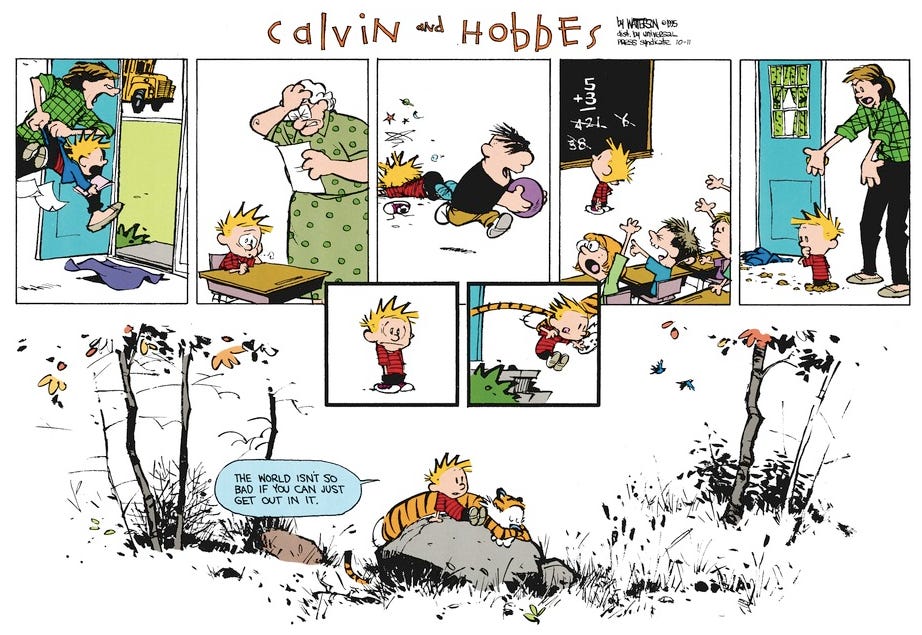I’d like to do another subscriber mailbag soon. So if you have any questions you’d like to see me answer, I’d love it if you’d drop them into the comments section below. Thanks!
So I’m working on a new novel. It’s early days. I haven’t even piled up 40 pages. Giving up would be easy. If I gave up now, I’d only have burned dozens—rather than hundreds or thousands—of hours of my life on this project. The problem is that I have to turn something in for workshop in a few weeks, so I’m lashed to the mast for at least that long.
Plus, I kinda like this new thing. I can imagine a life together for us, resenting each other’s existence and not talking for weeks at a time. That’s what I’m looking for in a novel manuscript and in a romantic partner.
Rather than doing a conventional essay about what my novel is about (I have certain superstitions about that), I’d like to give you a five-step guide to revising your novel even as you sail onward into fog that definitely conceals an iceberg.
Step 1: Learn to despise your protagonist all over again
Your protagonist is a little friendlier than when you first met them. They don’t go out of their way to hurt you, no longer egging you on when you say that your sentences are shit. Their ways of tormenting you are beginning to feel stale. Yes, you already know that your diction is somehow both ornate and clipped in a way that’s distinctly Post-War and has no place in 2021. So many other protagonists have insulted you by making you aware of this fact. In fact, their once uniquely enervating voice is starting to sound like lots of other voices you’ve heard, including (most alarmingly) your own.
You begin to notice their virtues, and not in the harrowing way that, say, Tolstoy noticed Anna’s virtues. You begin to believe that the person you’re writing about might not deserve the terrible thing you’re about to do to them. It’s like imagining the rich inner life of a rat you’re about to behead in a science lab. You start to wonder whether you can really stick in the knife.
The only solution is to reignite the spark that brought you together in the first place. Clear out a weekend. Pull the blinds. Sit down with your novel manuscript in the dark and count the hours until it’s socially acceptable to order a gyro on Seamless. Stare into the blue light until the letters start to look like the scratchings of some evil barnyard bird. You’ll start to think, What kind of demonic being would exist in the form of these hideous symbols? Once you develop a powerful headache and are considering burning all forms of ID and surreptitiously moving into a storage unit, you’re ready to hate your protagonist all over again.
Step 2: Bulk ordering Japanese beer
The store down the street sometimes stocks Asahi or Sapporo, but not consistently. And you always seem to be buying the last six pack. There might be a way to order a case (four six packs) at a time if you can find the right retailer. It’s a cliche to drink while you’re writing a novel, but if you do it with a macrobrew pilsner from Japan, at least you can do it crisply, cleanly. Yukio Mishima probably drank the same beers while he was working.
(Actually Mishima probably didn’t drink a nice Asahi while writing, because he did everything in the most batshit way possible, and drinking an ice-cold brew is one of the more normal things you can do. Which is why it’s a risky thing to do while you’re making up a shitty, stupid story.)
Step 3: Read books that are vastly better than yours
Happily or not, this probably won’t apply to every single book in the bookstore. They publish a lot of garbage these days—and always have. It’s really really really important to bear in mind that the vast majority of novels that have ever been published, especially as you reach deeper into the past, are dross. People churning out books in the Nineteenth Century weren’t magically all masters of the novel form, even if they were more likely to read some Ancient Greek.
So you may have to do some searching to find a novel so good it makes you angry. (Don’t cheat by going for the classics shelf—no one deserves to compare themselves to Emily Brontë.) Feel free to peruse my newsletter’s back catalogue for some recommendations. Max Porter’s two novels are widely available in bookstores. Pick up Grief is the Thing with Feathers and let yourself get angry. How does he get away with these clipped, cryptic sentences? How is he allowed to make the two kids sound like that? What the hell is going on with the magical crow’s shifting voice?
It’s infuriating, and if you’re lucky, your protagonist will help you feel even worse.
Step 4: Walk over the train tracks at sundown
Strips of purple cloud draping unevenly over pink, as if someone has tied a sash around the mountains and then let rags fall over it. Oil trains from Alberta lined up like ammunition for a war that will never happen. Old men in work jackets on the ramp, clutching cups of coffee that went cold an hour ago. Promise of ever-deeper shadow down there in the already-blue snow along the tracks.
Yeah that paragraph is kinda shit, but the walk was nice.
Step 5: Keep rewriting that one paragraph
It’s about your protagonist spooning penne into their mouth and having a sudden memory. It sounds stupid when you put it that way, but humor me, OK? No, stop turning and looking at me and grinning like a miniseries serial killer while you let the food hover like that. Just put the penne in your mouth. No, faster. This is supposed to feel organic to the reader. Once the penne is there, you’re going to remember that summer you spent at your aunt’s, at the side of the pool, where your cous—no, don’t fling the penne over there. That doesn’t make any sense. You don’t have any motivation to be doing that. Put down the knife. I have my own knife. You’ll be sorry if you don’t put down the knife and do the elaborate memory thing and convince the reader this is good.
Calvin and Hobbes Corner
I’m including this within the leaf collection arc because it’s right smack in the middle chronologically, despite not being part of that exact story. Thematically, it slots in fairly neatly: Calvin’s life is chaotic and harried, in an ordinary enough way, and he seeks respite out in the forest with Hobbes.
Calvin engenders his own chaos, of course. His failure to collect leaves is about to come to a head. But for now, the ordinary chaos baseline is bad enough, and calls for seeking an eye to the storm. “The world isn’t so bad if you can just get out in it” implies that the “world” is really out here, among the trees. Getting smacked in the nose by a dodgeball thrown by Moe is something else—a dream? It doesn’t have to be any realer than you let it be, if you find the right boulder to sit on.
I’ve always loved the way Calvin’s mom picks him up by the belt and hurls him out the door. That’d probably scan as a little edgy today—vaguely abusive, even if it’s slapstick comedy within a cartoon. Converting a kid into a missile is something you’re not supposed to do in real life. That’s why it’s perfect for Calvin: Just enough embellishment to feel like a worthy portrait of the feeling of trying to hurl an ornery intransigent into the chaos that he’s failing to tame.
A poem
Frank Stanford is looking at dead trees






According to the two Mishima biographies I've read, he was very nearly a teetotaler.
"The next day, [Tennessee Williams] recalled, Mishima telephoned him and said “Tennessee, you know I really like you, but you really shouldn’t drink so much,” an unsurprising comment from a novelist who is reputed to have gotten drunk only once in his adult life."
(Here's the source for that quote, on the top of page 52: https://www.researchgate.net/publication/271297479_Yukio_Mishima_the_Unambiguous_and_Myself_Living_through_a_Writer's_Legacy )
If Mishima were the type of dude to relax with an ice-cold brew, it's fair to assume said brew would be the ones you mentioned. It's not your fault that he was a different type of dude altogether. But he likely would have chosen a Japanese beer over foreign imports for let's say ideological reasons, so if you really wanted to approximate his habits (maybe not the best idea) you should probably become a hardcore partisan for, say, Melvin Brewing.
I enjoy these kinda insouciant peaks behind the curtain.
I think it's fair to include this comic in the arc; the previous strip gave us a deadline, and this shows how Calvin's spending at least part of the week he has left to procrastinate. In keeping with most of the arc so far it's just completely normal Calvin stuff. There's a lot of great visceral motion stuff, and expression work, in this strip.